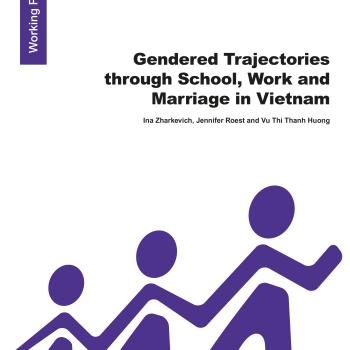
This working paper examines how gender affects the trajectories of girls and boys in Vietnam through school, work and marriage, from childhood, through adolescence and into early adulthood. It explores when gender inequality begins to open up in childhood; in which domains, how and why gender disparities persist across adolescence and into early adulthood; and, finally, whether and how gendered norms, values and practices impact on children’s trajectories.
Using analysis of Young Lives longitudinal qualitative data, gathered from children and their parents, and descriptive survey statistics, we find that:
gender is not always a key driver of children’s divergent schooling, working and marriage trajectories; intersectionality of socio-economic status, locality and ethnicity plays an important role, with locality and ethnicity associated with the widest gaps in school, work and marriage trajectories; gender gaps in Vietnam do not appear to open up until mid- to late adolescence, closer to senior secondary school, with girls more likely to continue their education at a higher level; girls’ slight advantage in education does not necessarily translate into an advantage in the labour market, since boys have access to more prestigious and better-paid jobs.Our findings indicate that gender gaps evolve over the life-course and are shaped by socio-economic status, ethnicity and locality, as well as by social norms, which have a particularly strong bearing on gender relations as girls and boys come of age and as they start families. This highlights the importance of longitudinal research and the life-course approach for understanding the gendered nature of young people’s pathways.

This working paper examines how gender affects the trajectories of girls and boys in Vietnam through school, work and marriage, from childhood, through adolescence and into early adulthood. It explores when gender inequality begins to open up in childhood; in which domains, how and why gender disparities persist across adolescence and into early adulthood; and, finally, whether and how gendered norms, values and practices impact on children’s trajectories.
Using analysis of Young Lives longitudinal qualitative data, gathered from children and their parents, and descriptive survey statistics, we find that:
gender is not always a key driver of children’s divergent schooling, working and marriage trajectories; intersectionality of socio-economic status, locality and ethnicity plays an important role, with locality and ethnicity associated with the widest gaps in school, work and marriage trajectories; gender gaps in Vietnam do not appear to open up until mid- to late adolescence, closer to senior secondary school, with girls more likely to continue their education at a higher level; girls’ slight advantage in education does not necessarily translate into an advantage in the labour market, since boys have access to more prestigious and better-paid jobs.Our findings indicate that gender gaps evolve over the life-course and are shaped by socio-economic status, ethnicity and locality, as well as by social norms, which have a particularly strong bearing on gender relations as girls and boys come of age and as they start families. This highlights the importance of longitudinal research and the life-course approach for understanding the gendered nature of young people’s pathways.

